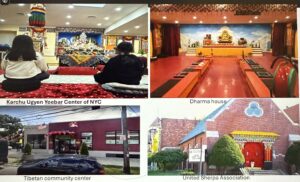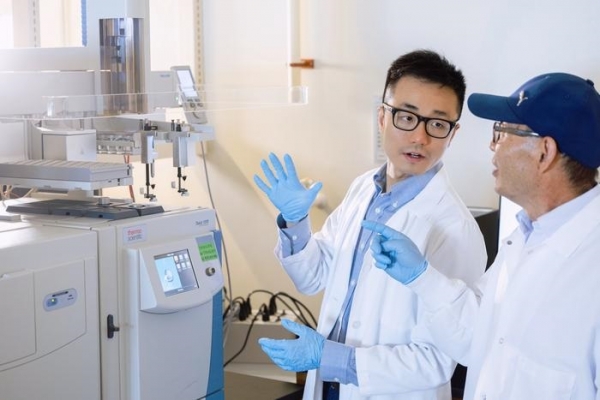New York City is home to vibrant and diverse Himalayan communities originating from Nepal, Tibet, Bhutan, Sikkim, Ladakh, and the hill regions of India such as Darjeeling and Kalimpong. These groups have established a network of cultural, religious, and social institutions throughout the city and its surrounding areas. These institutions not only preserve ancient traditions but also serve as vibrant community centers that engage broader New Yorkers, fostering cross-cultural understanding and participation.
Queens as a Cultural Hub for Himalayan Communities
Often celebrated as the most ethnically diverse borough of New York City, Queens has become a vibrant cultural sanctuary for Himalayan immigrants. In neighborhoods like Woodside, Elmhurst, and Maspeth, a constellation of spiritual centers, monasteries, and community halls flourish—each playing a vital role in preserving ancient Himalayan traditions while fostering intercultural dialogue, spiritual practice, and communal solidarity.

Tibetan Community Center of NYNJ, Woodside
This center serves as the heart of the Tibetan and Himalayan immigrant community in New York and New Jersey. It hosts annual Losar (Tibetan New Year) celebrations, cultural festivals, traditional music and dance performances, and intergenerational storytelling sessions. The space also supports youth mentorship, Tibetan language classes, and community dialogues aimed at preserving cultural memory and promoting civic engagement.
Drukpa Center, Woodside
Representing the Drukpa Kagyu lineage, the center is inspired by the teachings of His Holiness Gyalwang Drukpa. Activities include regular meditation sessions, dharma talks, mantra chanting, and compassionate action projects. The center also engages in outreach that bridges Himalayan spirituality with contemporary life in New York City, offering workshops on mindfulness, ecology, and ethical living.
Karchu Ugyen Yoebar Center of NYC, Elmhurst
Affiliated with the Nyingma lineage and under the spiritual guidance of H.E. Namkhai Nyingpo Rinpoche, this center nurtures the spiritual needs of the community through tantric practices, tsok offerings, empowerment ceremonies, and cultural events. It also serves as a communal space for prayer gatherings and social support among Himalayan immigrants.
Mustang Monastery, Woodside (Under Construction)
Led by community members from Upper Mustang, this upcoming monastery is envisioned as a cultural and spiritual sanctuary for the Loba community. It will feature a traditional shrine hall, offer pujas, and serve as a center for teaching Himalayan arts, oral history, and Buddhist philosophy to the younger generation born or raised in the diaspora.
United Sherpa Association’s Monastery, Elmhurst
This active monastery offers daily and seasonal Buddhist pujas rooted in the Nyingma and Kagyu traditions. Founded by Sherpa community leaders, it organizes spiritual Buddhist teachings, Sherpa cultural and religious festivals like Lhosar, Lhabab Duchen, Dukpa Chhechi, Chhechu, and educational programs such as Sherpa language classes, youth camps, and traditional music instruction.
Bhutanese Community Center, Maspeth
Run by Bhutanese, this center offers trauma-informed social services, cultural festivals, and religious rituals. Language preservation, youth leadership initiatives, and interfaith collaboration are among its core activities. It also serves as a temple during major festivals and hosts community dialogues to foster resilience and a sense of identity.
Dharma House NYC, Woodside
Under the direction of Chokyi Nyima Rinpoche and Rangjung Yeshe New York, Dharma House NYC is a multilingual center for study and practice in the Vajrayana Buddhist tradition. It hosts weekend teachings, Tibetan and English-language meditation retreats, online teachings, and prayer ceremonies. It also provides live transmissions of teachings from Ka-Nying Shedrub Ling Monastery in Nepal.
Nyingma Palyul Dharma Center NYC, East Elmhurst
Affiliated with the Palyul lineage and the late Penor Rinpoche, this center offers structured practice opportunities such as ngöndro (preliminary practices), Vajrasattva purification, and Guru Yoga. It supports a core sangha that participates in retreat weekends, tsok offerings, and seasonal pujas, including Chökhor Düchen and Saga Dawa.
Dudjom Dharma House NYC, Woodside
This center, aligned with the Dudjom Tersar lineage of the Nyingma school, provides teachings and practices rooted in the terma (revealed teachings) of Dudjom Rinpoche. Activities include weekly group practices, fire pujas, dharma discussions, and special empowerments led by visiting teachers from the lineage.
Sakya Tsechen Association and Sakya Center of New York, Woodside
Founded to preserve the Sakya tradition under the spiritual guidance of the Khön family, these centers organize regular Lamdre teachings, Hevajra and Vajrakilaya empowerments, and public teachings in both Tibetan and English. They also host cultural festivals, community prayer events, and youth education initiatives in Buddhist philosophy.
Sera Jey Buddhist Culture Center, Woodside
Affiliated with Sera Jey Monastic University, this center brings rigorous Gelugpa scholarship to New York. Resident geshes and visiting teachers provide in-depth teachings on Madhyamaka philosophy, Abhidharma, and monastic ethics. The center is also known for hosting public debates, pujas, and Tibetan Buddhist language courses.
Durga Temple and Nepalese Cultural Center – Ridgewood, Queens
This temple honors both Hindu and Buddhist Nepali traditions, serving as a spiritual anchor for Nepali immigrants. Founded by community elders, it holds daily pujas, weekly bhajan/kirtan sessions, and major Nepali festivals such as Dashain, Tihar, Teej, and Holi. It also offers cultural education programs in music, dance, and the Nepali language to preserve heritage across generations.
Cultural Institutions in Manhattan and Beyond
While Queens and Upstate New York serve as vital spiritual and cultural havens for Himalayan communities, Manhattan and its neighboring boroughs host important institutions that bridge Himalayan heritage with broader American and global audiences. These centers promote cross-cultural understanding, spiritual dialogue, and artistic expression, reflecting the depth and diversity of Himalayan traditions in the heart of New York City.
Tibet House US, Manhattan
Founded in 1987 at the request of His Holiness the Dalai Lama, Tibet House US is a cornerstone institution dedicated to preserving and celebrating Tibetan civilization. Through museum exhibitions, sacred music concerts, academic lectures, and online courses, it engages a wide audience in exploring the spiritual and cultural wisdom of Tibet and the greater Himalayan region.
The Tibet Center, Manhattan
One of the oldest Tibetan Buddhist centers in New York City, The Tibet Center was founded by Gelek Rimpoche and remains an important space for Gelugpa teachings, meditation, and interfaith dialogue. Its programs attract both seasoned practitioners and newcomers seeking to deepen their understanding of the dharma.
Kadampa Meditation Center, Manhattan
Part of the New Kadampa Tradition, this modern urban center offers drop-in meditation classes, day courses, and Buddhist teachings that are practical, accessible, and rooted in the Gelugpa lineage. The center emphasizes inner peace and mindfulness as tools for navigating contemporary life.
Yeshe Nyingpo Temple, Manhattan
Founded by Dudjom Rinpoche, a preeminent master of the Nyingma tradition, Yeshe Nyingpo serves as a sacred space for ritual practice, study, and community ceremonies. The temple preserves terma teachings and hosts visiting lamas who provide spiritual guidance to the community.
Gadenpa Buddhist Center, Manhattan
Affiliated with the Gelug school of Tibetan Buddhism, Gadenpa offers regular teachings, pujas, and meditation sessions in a traditional format. It maintains a close connection with monastic institutions in India and serves a diverse group of Tibetan and Western practitioners.
Jacques Marchais Museum of Tibetan Art, Staten Island
Established in 1947, this unique museum was envisioned as a Himalayan-style monastery and remains one of the most extensive repositories of Tibetan and Himalayan art in the United States. The museum offers guided tours, seasonal festivals, lecture series, and art workshops, making Himalayan heritage accessible to a wide audience.
Dorje Ling Buddhist Center, Brooklyn
Located in the heart of Brooklyn, Dorje Ling Buddhist Center serves as an inclusive spiritual space that welcomes practitioners from diverse backgrounds. The center hosts weekly meditation practices, dharma workshops, and empowerment ceremonies, featuring teachings from masters across various Tibetan Buddhist lineages. With programs offered in English and Chinese, Dorje Ling supports a multicultural sangha and makes Tibetan Buddhist wisdom accessible to both seasoned practitioners and newcomers.
Monasteries and Retreat Centers Upstate
Karma Triyana Dharmachakra (KTD), Woodstock
KTD was founded in 1976 by His Holiness the 16th Gyalwa Karmapa, Rangjung Rigpe Dorje, and is now under the spiritual guidance of His Holiness the 17th Karmapa, Ogyen Trinley Dorje. Situated atop Meads Mountain in Woodstock, KTD serves as the North American seat of the Karma Kagyu lineage of Tibetan Buddhism. The center offers regular dharma teachings, weekend and long-term retreats, empowerments, and public events. Practitioners from around the world come here to receive Mahamudra instructions and participate in Tibetan Buddhist ceremonies such as Losar and Kagyu Monlam. KTD blends profound monastic tradition with a welcoming, multicultural spirit.
Namgyal Monastery Institute of Buddhist Studies, Ithaca
Namgyal Monastery in Ithaca is the North American branch of the Dalai Lama’s personal monastery in Dharamsala, India. While His Holiness the 14th Dalai Lama serves as its spiritual leader, the center was established in the U.S. by monks from Namgyal to provide serious monastic training as well as open teachings for lay students. The institute offers a rigorous three-year curriculum in Buddhist philosophy, introductory meditation classes, debate training, and retreats rooted in the Gelug tradition. It hosts visiting scholars and promotes interfaith dialogue, making it a hub for both scholarly and contemplative engagement in Tibetan Buddhism.
Tsechen Kunchab Ling, Walden
Founded by His Holiness Sakya Trizin Ngawang Kunga, Tsechen Kunchab Ling is the North American seat of the Sakya school of Tibetan Buddhism. Located in the serene setting of Walden, this center offers teachings in Lamdre (the Path and Its Fruit), advanced tantric practices, and philosophical instruction from visiting Sakya lineage masters. In addition to traditional rituals and empowerments, the center conducts public dharma talks, weekend retreats, and cultural events, creating a vital link between the Sakya tradition and spiritual seekers in the West.
Samye Hermitage, Walden
Samye Hermitage in Walden was established by Lama Tashi Dondup as a peaceful rural retreat for contemplative practice rooted in the Kagyu and Nyingma lineages. The center supports both solitary and group retreats, focusing on foundational practices like shamatha and lojong, as well as Vajrayana rituals. With its simple facilities and quiet natural environment, the hermitage offers a rare space for deep, undistracted meditation and connection to nature. Occasional weekend teachings and sangha gatherings also enrich the experience for regular visitors.
Orgyen Cho Dzong Retreat Center, Greenville
Under the guidance of the late Khenchen Palden Sherab Rinpoche and his brother, Khenpo Tsewang Dongyal Rinpoche, Orgyen Cho Dzong serves as a retreat center dedicated to the Nyingma school of Tibetan Buddhism. The center hosts annual summer retreats focusing on Dzogchen teachings, seasonal pujas, and in-depth study of sacred texts such as “The Yeshe Lama” and “The Heart Sutra.” It emphasizes Guru Padmasambhava’s legacy through rituals, meditation, and Tibetan sacred arts. The peaceful Catskills location supports a deeply immersive retreat environment.
Palpung Thubten Choling Monastery, Wappingers Falls
Founded in 1977 by Lama Norlha Rinpoche, a senior disciple of the 16th Karmapa, Palpung Thubten Choling is a Karma Kagyu monastery offering residential monastic life and lay training. It is especially known for its traditional three-year-three-month retreat program. The monastery hosts regular group practices such as Chenrezig, Tara, and Guru Yoga pujas, as well as public retreats, empowerment ceremonies, and family-friendly events. With its strong discipline and devotion to lineage, Palpung remains a major center for preserving authentic retreat practice.
Tashi Kyil Tibetan Buddhist Institute, Kingston
Tashi Kyil Institute in Kingston was founded by monks from the parent monastery in Dehradun, India, to support both spiritual practice and cultural preservation among Tibetan refugees and the wider community. The institute offers weekly teachings in Tibetan and English, ritual ceremonies, public talks, and cultural programs including Tibetan language instruction and community celebrations. As a vital hub for cultural continuity, Tashi Kyil helps bridge generations and spiritual worlds within the Tibetan diaspora.
Padmasambhava Buddhist Center (PBC), Sidney Center
Established by the highly respected Nyingma masters Khenchen Palden Sherab Rinpoche and Khenpo Tsewang Dongyal Rinpoche, Padmasambhava Buddhist Center (PBC) is devoted to the teachings of Guru Rinpoche. The center offers a rich calendar of activities, including seasonal retreats, empowerments, sacred music and art workshops, and intensive study programs. Special emphasis is placed on Dzogchen teachings, heart advice from the lineage masters, and the preservation of the Nyingma Terma tradition. The community maintains a deeply devotional atmosphere balanced with scholarly precision.
Samye Hermitage New York, Cooperstown
Founded by Lama Chödrak Gyatso Nubpa, Samye Hermitage in Cooperstown provides a rustic environment for solitary and small-group retreats. Rooted in both the Karma Kagyu and Nyingma traditions, the center offers personalized guidance in advanced meditative techniques like Mahamudra and Dzogchen. Its simple setting supports serious practitioners seeking long-term practice away from distraction. Occasional teaching events and seasonal sangha meetings provide structure and support to the retreatants.
Dharmakaya Center for Wellbeing, Cragsmoor
The Dharmakaya Center was founded by Trungram Gyalwa Rinpoche with the vision of integrating traditional Buddhist philosophy with modern approaches to holistic wellness. The center offers meditation retreats, health and wellness programs, yoga, and public teachings that nourish both mind and body. Rooted in the Kagyu and Nyingma traditions, Dharmakaya emphasizes balance, healing, and compassionate living in a serene natural setting designed to rejuvenate and inspire.
Mahayana Temple Retreat, Leeds
The Mahayana Temple Retreat in Leeds is operated by the Eastern States Buddhist Temple of America, a Chinese-American organization. The retreat offers Pure Land and Mahayana Buddhist teachings, meditation sessions, chanting services, and monastic retreats. The temple also serves as a pilgrimage site for Chinese Buddhist devotees and hosts public events celebrating traditional festivals such as Vesak and the Ullambana Festival. It reflects the enduring vibrancy of East Asian Buddhist traditions in the American landscape.
Phayul Retreat Center, MacDonough
Founded by Tibetan community leaders from New York and New Jersey, Phayul Retreat Center was created as a sanctuary for both spiritual practice and cultural continuity. Surrounded by forest and open land, the center hosts meditation retreats, language and ritual classes, and workshops in Himalayan arts. It also serves as a gathering place for youth camps, intergenerational teaching, and religious festivals, providing a nurturing space for the preservation of Tibetan identity in the diaspora.
Kadampa Meditation Center, Glen Spey
Part of the global New Kadampa Tradition (NKT), the Kadampa Meditation Center in Glen Spey was founded by Venerable Geshe Kelsang Gyatso. This serene retreat offers guided meditations, weekend and week-long retreats, and modern Buddhist teachings presented in a highly accessible format. With its resident teachers and residential retreat facilities, the center provides a welcoming space for people of all backgrounds to experience inner peace through structured and practical teachings rooted in the Mahayana tradition.
Garrison Institute, Garrison
Nestled above the Hudson River in a former Capuchin monastery, the Garrison Institute offers a sanctuary for contemplative practice, spiritual inquiry, and social renewal. While not a traditional Buddhist monastery, the Institute draws deeply from Buddhist lineages—especially Zen, Tibetan, and Insight traditions—hosting renowned teachers such as Sharon Salzberg, Roshi Enkyo O’Hara, and teachers from the New York Zen Center for Contemplative Care. The institute’s retreat calendar is dotted with silent sesshins, mindfulness immersions, and dharma-centered gatherings that honor Buddhist principles of compassion, interdependence, and awareness. In bridging contemplative wisdom with social action and science, the Garrison Institute serves as a vital crossroads where ancient Buddhist teachings meet modern human concerns.
A Mosaic of Himalayan Ethnic Communities
New York’s Himalayan population is a vibrant mosaic of diverse ethnic groups, including Sherpa, Tamang, Gurung, Newar, Magar, Hyolmo, Walung, Mugum, Chum, Manang, Nupri, Bhutanese, Tibetans, and Nepali-speaking Indians from Darjeeling, Kalimpong, and Sikkim. Each community brings its own distinct language, rituals, festivals, and culinary traditions, contributing to the cultural richness and intricate identity of the Himalayan diaspora in the city.
Major festivals such as Losar (Tibetan New Year), Saka Dawa (commemorating the birth, enlightenment, and passing of the Buddha), Tshechu, Lhabab Düchen, Dukpa Tsechi, and a wide array of Nepali celebrations—including Dashain, Tihar (Festival of Lights), Indra Jatra, Ubhauli–Udhauli, and Maghe Sankranti—are observed with deep devotion and joy. On these festive days, community centers, public parks, and school auditoriums across New York come alive with music, dance, food, and spiritual ceremonies, turning the city into a space of intergenerational cultural exchange and shared celebration.
New Yorkers from the Himalayas have established vibrant communities and institutions that preserve and share their heritage with the wider city. From Queens neighborhoods like Woodside, Elmhurst, Ridgewood, and Maspeth to upstate retreat centers, these organizations provide places for worship, education, healing, and celebration. Through festivals, teachings, and community programs, they keep Himalayan traditions alive and enrich New York’s cultural landscape, ensuring that the spirit of the mountains thrives in the urban environment.











